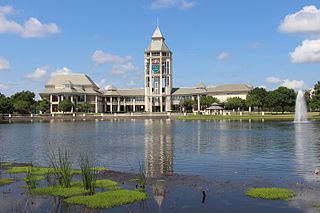
Roberto De Vicenzo was a professional golfer from Argentina. He won a record 229 professional tournaments worldwide during his career, including seven on the PGA Tour and most famously the 1967 Open Championship. He is perhaps best remembered for signing an incorrect scorecard that kept him out of a playoff for the 1968 Masters Tournament.
Donald Ray January was an American professional golfer, best known for winning the 1967 PGA Championship.

The World Golf Hall of Fame was, until recently, located at World Golf Village between Jacksonville, Florida and St. Augustine, Florida, in the United States. It is unusual amongst sports halls of fame in that a single site honored both men and women. It is supported by a consortium of 26 golf organizations from all over the world. It is moving back to Pinehurst, North Carolina, with the new campus opening in 2024.

Gene Alec Littler was an American professional golfer and a member of the World Golf Hall of Fame. Known for a solid temperament and nicknamed "Gene the Machine" for his smooth, rhythmical swing, he once said that, "Golf is not a game of great shots. It's a game of the best misses. The people who win make the smallest mistakes."
Andrew Stewart North is an American professional golfer who had three wins on the PGA Tour, including the U.S. Open twice. Since 1992, he has served as a golf analyst for ESPN.
Gary D. Koch is an American professional golfer, sportscaster and golf course designer, who formerly played on the PGA Tour, Nationwide Tour and Champions Tour.
James Joseph Colbert is an American professional golfer.
Robert George Goalby was an American professional golfer. He won the Masters Tournament in 1968, after Roberto De Vicenzo notably made an error on his scorecard. It was Goalby's lone major championship among 11 Tour wins achieved between 1958 and 1971.
Jesse Carlyle Snead is an American professional golfer who won tournaments on both the PGA Tour and Champions Tour. Snead is the nephew of hall of famer Sam Snead.
Orville James Moody was an American professional golfer who won numerous tournaments in his career. He won the U.S. Open in 1969, the last champion in the 20th century to win through local and sectional qualifying.

Thomas Henry Bolt was an American professional golfer. He did not join the PGA Tour until he was in his thirties, but he went on to win 15 PGA Tour titles, including the 1958 U.S. Open. He played in the Ryder Cup in 1955 and 1957.

The Genesis Invitational is a professional golf tournament on the PGA Tour in southern California, first played 98 years ago in 1926 as the Los Angeles Open. Other previous names include Genesis Open, Northern Trust Open and Nissan Open. Played annually in February at the Riviera Country Club in Pacific Palisades, it is often the concluding event of the tour's "West Coast Swing" early in the calendar year, before the tour moves east to Florida.
C. L. "Gibby" Gilbert II is an American professional golfer who has won tournaments on both the PGA Tour and Champions Tour.

The Bass Pro Shops Legends of Golf at Big Cedar was a golf tournament on the PGA Tour Champions. From 2014 to 2019, it was played at Big Cedar Lodge in Ridgedale, Missouri on the par-3 Top of the Rock course, designed by Jack Nicklaus and the 18-hole Buffalo Ridge course, redesigned by Tom Fazio. The tournament was sponsored by Bass Pro Shops, which owns the Big Cedar Lodge. It is often called "The tournament that launched the Champions Tour". Starting in 2018, a second par-3 course, Mountain Top, a 13-hole course designed by Gary Player, was added to the tournament, which has the oddity of being a 67-hole tournament.
Junius Joseph "Jay" Hebert was an American professional golfer. He won seven times on the PGA Tour including the 1960 PGA Championship. His younger brother, Lionel Hebert, also won the PGA Championship, in 1957, the last edition at match play. Jay played on the 1959 and 1961 Ryder Cup teams and was captain for the 1971 team.
Jimmy Powell was an American professional golfer who played on the PGA Tour in the 1960s and 1970s, but whose greatest success came on the Senior PGA Tour in the early to mid-1990s.
Joe Jimenez was an American professional golfer, best known for winning the 1978 PGA Seniors' Championship.
Pete Brown was an American professional golfer who is best known as the first African American to win a PGA Tour event with his win at the Waco Turner Open.
Purvis Jennings "Jim" Ferree was an American professional golfer who played on the PGA Tour and the Senior PGA Tour.

Uneven Fairways: The Story of the Negro Leagues of Golf is a 2009 documentary film of the history of African-American golfers. The documentary premiered on the Golf Channel on February 11, 2009 and is based on the books Uneven Fairways by Pete McDaniel, and Forbidden Fairways, by Dr. Calvin Sinnette. The film was directed by Dan Levinson.







